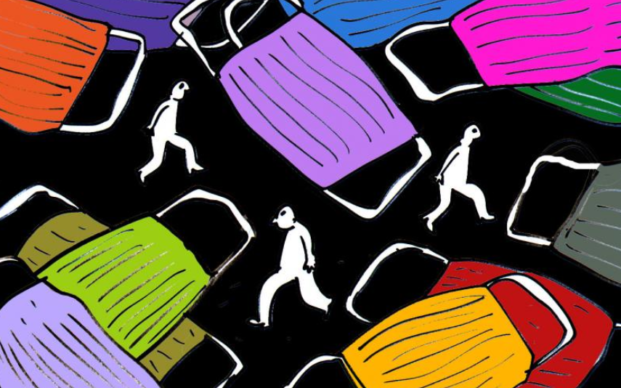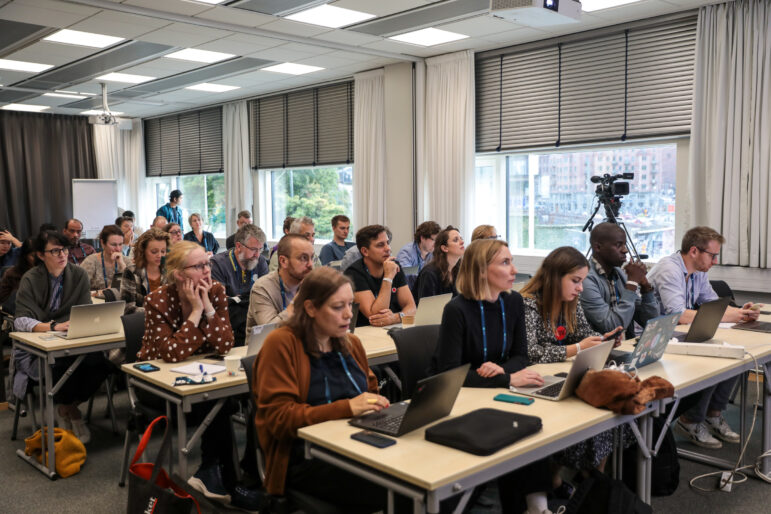

Data Journalism Top 10: Chinese Propaganda, Social Media Abuse, Herd Immunity, Florida Condo Collapse, Pandemic Plastic
Read this article in
With less than a month until the start of the Olympic Games, host country Japan’s slow vaccination campaign is causing concern. Our NodeXL mapping from June 21 to 27, which tracks the most popular data journalism stories on Twitter each week, found this New York Times piece on Japan’s efforts to combat the pandemic in the run-up to the big games. In this edition, we also feature a joint investigation by ProPublica and the Times into a Chinese online propaganda blitz, a herd immunity calculator by German newspaper Zeit, and revelations from the Guardian about abusive posts on social media targeting English soccer players.
Chinese Propaganda Blitz
Thousands of videos circulating on social media show members of the Uyghur community in Xinjiang defending the Chinese Communist Party, even as international condemnation of the country’s mistreatment of the Uyghurs grows. The videos are meant to look like genuine accounts. But an investigation by ProPublica and The New York Times, in which reporters analyzed more than 3,000 videos, found evidence of an influence campaign orchestrated by the Chinese government.
Visualizing Violence Against Women
In the northwestern Costa Rican province of Guanacaste, violence against women is a major problem. Data journalist Hassel Fallas published a series of interactive graphics looking at domestic violence, femicide, and other crimes experienced by women. The graphics are part of an investigation led by La Voz de Guanacaste, the first bilingual nonprofit newspaper in Costa Rica.
Herd Immunity
Achieving herd immunity — through vaccination or from antibodies naturally developed after an infection — is seen as one of the keys to putting an end to the global pandemic. But how many people do countries need to vaccinate in order to sufficiently contain COVID-19? German newspaper Zeit published an interactive calculator to give a rough answer to this question and simulate possible scenarios depending on the strain and how many people are infected.
Japan Prepares for the Olympics
The Summer Olympic Games, after postponement last year, are scheduled to start in Tokyo in late July. But Japan saw a surge of coronavirus cases last month, and while case numbers have decreased, the country’s low vaccination rate continues to cause concern among experts. The New York Times analyzed statistics from Our World in Data and Johns Hopkins University to take a closer look at how Tokyo’s vaccination campaign is going just weeks before the opening ceremony.
Sport Climbing
Debuting at the Tokyo Olympics this year is sport climbing, which combines bouldering, lead climbing, and speed climbing into a single event. Data journalist and software developer Niels de Hoog gathered data on climbers to watch and wrote this preview to help readers better understand the various disciplines.
https://twitter.com/nielsdhg/status/1405080876296384512
Social Media Abuse
Abuse on social media is a problem of the digital age. Athletes and other sports personalities are acutely aware of it. In England, soccer players are regularly attacked and threatened on Twitter, Instagram, and other platforms. An investigation by the Guardian revealed that during the belated Euro 2020 championship, over 2,000 abusive posts — including racist messages — have been directed toward footballers from the English national team such as Harry Kane and Raheem Sterling.
A Plastic Pandemic
The European Union had ambitious plans to cut the use of plastic products, but instead of marking a turning point in the fight against plastic waste, last year saw a new kind of litter polluting the environment. Data analysis by Osservatorio Balcani e Caucaso Transeuropa, published by VoxEurop, warns of the negative consequences of the boom in masks, gloves, and other medical waste created as a result of the pandemic.
Bird Paradise
In 2014, biologist Felicia Sanders discovered that the largest nocturnal roosting place for the Hudsonian whimbrel — a type of wader, also known as a shorebird — is a small island on the coast of South Carolina in the United States. An interactive piece by The New York Times uses satellite imagery to show how the birds fly thousands of kilometers to reach Deveaux Bank and why it is important to protect this wildlife sanctuary from human activity.
Florida Condo Collapse
More than 140 people are missing and 18 are known to have died in the collapse of a 12-story condominium tower in Miami, Florida, last week. Univision published this graphics-led piece (in Spanish) to visualize how the Surfside tower block crumbled while comparing how the building looked before and after the devastation.
Trump’s Golf Trips
During his time as US president, Donald Trump spent a total of 99 days at his Bedminster golf club in New Jersey. These trips cost US taxpayers more than $2.4 million, according to Secret Service records obtained by NJ Advance Media, a local news outlet. Reporters found that most of the funds were spent on hotel rooms and travel expenses for Secret Service agents, although $81,000 went to golf carts.
Thanks again to Marc Smith and Harald Meier of Connected Action for gathering the links and graphing them. The Top Ten #ddj list is curated weekly.
 Peter Georgiev is GIJN’s social media and engagement editor. Previously, he was part of NBC News’ investigative unit in New York. He also worked as a correspondent for Bulgarian National Television and his reporting has been published by the Guardian, Deutsche Welle, and other international outlets.
Peter Georgiev is GIJN’s social media and engagement editor. Previously, he was part of NBC News’ investigative unit in New York. He also worked as a correspondent for Bulgarian National Television and his reporting has been published by the Guardian, Deutsche Welle, and other international outlets.










